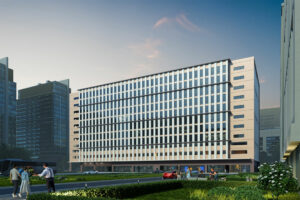By Justine Irish D. Tabile, Reporter
POTENTIAL foreign investors continue to make inquiries about possibly locating operations in the Philippines even in the face of US tariff uncertainty, Aboitiz InfraCapital Economic Estates (AIC Economic Estates) said.
“Because of the value that we’ve created in our estates, for us from where we’re sitting, it’s business as usual,” Monica Lorenzana Trajano, vice-president and head of commercial strategy at AIC Economic Estates, said at a media roundtable on Tuesday.
She said there has been no slowdown in the inquiries, describing the flow of communications with potential investors as “constant.”
“It’s a constant flow because we are also constantly expanding, so when the international locators see us, they see their ability to scale,” she said.
“Our ecosystem is world-class, so they are able to compare us with other countries in terms of support for their growth or expansion. So, tariff-wise, I would not say there has been a slowdown,” she added.
She said the China plus one strategy, under which investors remain in China but seek an alternative production center, is driving locator behavior because of the need to derisk supply chains.
“What we are also seeing is that a lot of foreign companies are understanding the strength of our domestic market,” she said.
She cited the cases of Epson and Yamaha, two of its major locators which are geared towards the domestic market.
However, she said that the company is concerned by US President Donald J. Trump’s plan to impose tariffs on semiconductors, as the economic estates is highly exposed to companies in the electronics supply chain.
“Right now, we’re a bit at par with the rest of Southeast Asia in terms of tariffs at 19%…” she said. “Things are in flux because things are still being negotiated, if I’m not mistaken, in Washington, DC. But even at 19%, there are exceptions, (including) electronics,” she added.
She said that the hope is that the Philippines-US relationship will influence the outcome of the negotiations.
Earlier this month, the government said it will try to push for the exemption of semiconductors, among other Philippine exports, in its negotiation with the US.
She said interest from US information technology and business process management (IT-BPM) companies continues despite proposals to reshore the US call center industry.
A bill introduced in the US Senate last month proposes restrictions on US firms outsourcing call center operations, including making them ineligible for new Federal grants or guaranteed loans.
She noted, however, that the bill has had “no effect yet … And there are homegrown business process outsourcing (BPO) companies that are actually inquiring about LIMA Tower One,” she added.
To date, about 54% of LIMA Tower One, an office building at its Lime economic zone in Lipa, Batangas, has been leased out since its launch in the fourth quarter of 2024.
“More are coming in, so we are hitting our targets,” she added.
Nico de Leon, assistant vice-president for sales and leasing at AIC Economic Estates, said that BPOs go where the talent pool is, with the focus of expansions turning to the provinces.
“It is more going to provincial areas. BPOs in Metro Manila keep their headquarters here, but are growing in the countryside,” he said.
He said that BPOs still see outsourcing as a response to high costs in the US.
Meanwhile, he said that the Philippine Economic Zone Authority’s proposed implementing rules and regulations for work-from-home arrangements will make economic zones more attractive for IT-BPM locators.
“That is going to help grow the BPO industry. I think at the end of the day, having flexibility in the work setup for the BPO employees is something that the new workforce is looking for right now,” he said.
